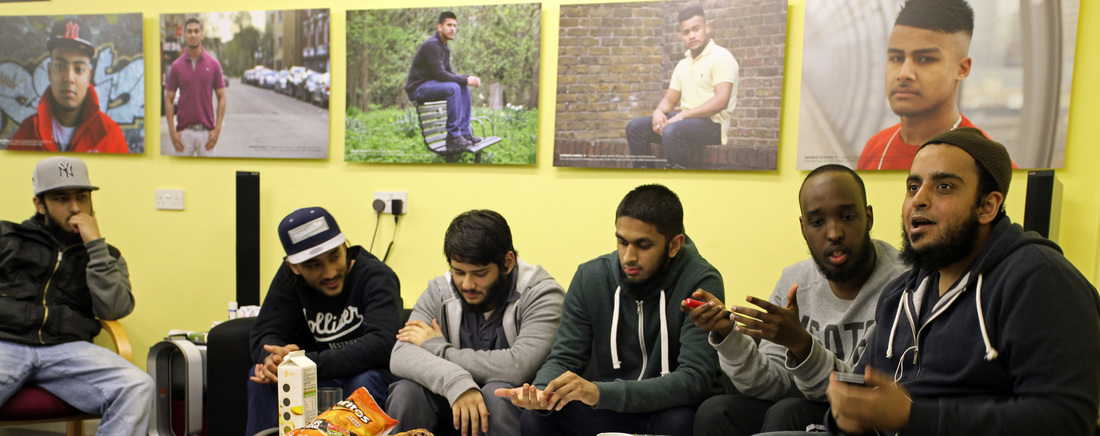moving forward
It starts around age 11 or 12, Year 6 or 7, the antisocial behaviour. It starts from the little things. You start bunking from Year 7; when you’re younger you see other people doing it, older people. If you were to rewind, I’d go back to school, I’d be a boffin |
As stated from the outset, we feel that the issue of offending and re-offending has to be tackled with an awareness of overlapping factors such as stereotyping, social inequalities, education the role of family, aspiration and employment. These are factors that are often overlooked in schemes focused simply on mentoring or finding employment for ex-offenders.
We have come up with a number of recommendations that we believe have potential to bring into motion the multi-level change necessary in order to address offending and re-offending among young Muslim men. Recommendations 1. Schools intervention The curation of education resources aimed at raising aspirations of pupils, in partnership with schools in Walthamstow, an area where there is a significant Muslim male population. This would also involve working with teachers to address cultural competence in teaching and the varying needs of students from different backgrounds.
We have identified and been approached by three groups of young Muslim men based in East London, North London and Leicester to help incubate them and develop their ideas. We are looking at models of successful networks or incubation programmes such as at St Giles Trust that could be used to help support young Muslim men. This would build on our mentoring of members of MCP over the past two years and our work helping them to build their own networks. 3. Influence policy making
Given the entrenched nature of the inequalities facing Muslim men who enter the CJS, we understand that interventions need to take place on a number of levels in order to affect change in both practice and policy. We are currently doing this at a sentencing level - working to ascertain whether prosecutors and sentencing guidelines are properly equipped to deal with young Muslim men. This exercise was initiated in response to recommendations from The Young Review that a range of practical and powerful tools be developed for future providers to reverse the dis-proportionality facing Muslim men who come into contact with the CJS. You can read the findings of this research here. Among our recommendations will be that training for magistrates should be developed so that problems associated with stereotyping and unconscious bias can begin to be overcome. This should involve working directly with young people who have experienced the CJS, and building an understanding of different positive networks that can exist within Muslim communities. We also sit on an advisory board to the Ministry Of Justice looking at the challenges facing Muslim men within the CJS and once they leave. 4. Change wider public narratives
Campaigns or creative projects that can disentangle the blunt negative media coverage and foster more understanding of the daily lives of Muslim communities for magistrates, probation workers, and the police are needed. This goes beyond diversity training for instance which would involve understanding the specific elements of a religion. This is more about challenging entrenched attitudes and would require an unexpected approach. Increasingly, Maslaha is also seeking to change public attitudes with all of our projects through mainstream media and social media. A recent project, islamandfeminism.org was widely received on social media as well as The Observer, BBC Radio, Daily Telegraph, and international newspapers. We feel we have the expertise and experience now to run a similar positive campaign for this project. 5. Knowledge-building around Islam
Knowledge-building around Islam and the idea that the Muslim faith can be a strong and positive tool for addressing offending and re-offending among young Muslim men. This would involve authorities working closely with young Muslim men who have been in prison and have a unique experience and knowledge that should be recognised as expertise and has strong potential to reduce offending. The Young Review reported that while many Muslim ex-offenders and prisoners have highlighted Islam as a positive force, authorities view it with suspicion.[1] A HMIP report in 2010 found that Muslims still report the least positive perceptions of prison life.[2] The overwhelmingly negative light in which Islam is viewed by authorities at different stages of the CJS, sits in stark contrast with the actual experiences of Muslim prisoners and ex-offenders, many of whom describe religion as a positive and supportive influence in coping with both prison and release. The increase of Imams in the Prison Chaplaincy Service over the last decade has similarly been observed to improve Muslim prisoners’ experiences and provide confidence in the outcome of prison procedures.[3] Failing to recognise and harness the potential of religion to contribute positively to the lives of young Muslims, is a missed opportunity on the part of authorities. [1] Young Review, p. 34 [2] https://www.justiceinspectorates.gov.uk/hmiprisons/wp-content/uploads/sites/4/2014/04/Muslim_prisoners_2010_rps.pdf p. 8 [3] Young Review, p. 4 6. Valuing and supporting existing community organs
The Mile End Community Project (MCP), with whom we conducted our initial two years of research, has been working regularly with young people in East London since 1995. MCP is a vital aspect of these young men’s lives in providing a safe space that increases the chances of these young men not re-offending and providing them with opportunities for a more fulfilling life. We recommend, as was included in the Young Review recommendations that groups such as MCP, who provide considerable local support on often very limited resources, be valued and supported to be able to continue providing the same services in a sustainable way. We are supporting MCP to develop their business plan and model and review what the organisation will be doing in the future. The partnership with Young Enterprise will help broaden MCP’s network and potentially provide a partner who is willing to work with them across a number of different geographical areas. Read more about MCP here. |


